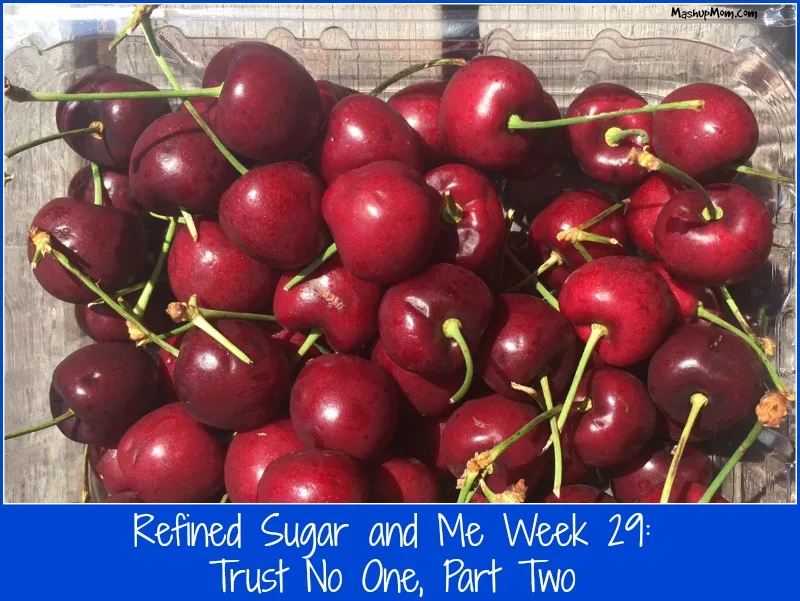
Welcome to week 29 of our ongoing (yet sometimes intermittent) series about refined sugar & me in 2017. This week I'm still plateaued at 16 pounds down from when I first started avoiding most added sugars and processed foods at the end of December 2016.
But on a more upbeat note, this week's win was: Not drowning my sorrows in ice cream when I took the kids for theirs on the same day we lost a bunch of freezer food (due to my own error!). The ice cream shop smelled great, but I was OK just watching them partake -- and that's huge. 🙂
What am I loving for added-sugar-free snacking this week? CHERRIES. They're in season, and they've been so affordable around here lately, yum.
What are we reading this week?
This week is going to be more about sharing some of the things I've been reading lately -- which aren't all about sugar per se, but are all about real food, diets, and food labeling -- which is all related; you can't think about one without the other. So let's jump right into this week's fascinating reading material with: Are Diets Just Placebos?
If no diet has turned out to be a silver bullet for weight loss, then what could explain why some of them at least seem to work, at least for some time? In looking at our rampant dieting culture, I realized that there are a lot of elements that remind me of the placebo effects we see in other parts of our lives. And this got me thinking: Perhaps it’s not the contents of the diet that matters. Perhaps it’s simply the act of dieting. Is it possible that, rather than the specifics of the food regime you undertake, it’s the mere act of starting a diet—any diet—that makes you thinner? Could it be that the inherent placebo effect that comes with any diet is what’s causing you to lose weight?
Well, that's some food for thought (as it were)... And, here's some more for you.
Trust No One, part the second
A couple of months ago in this space we talked about the mixed and ever-changing messages about what's "good" and "bad" for us. I'd like to unpack that a little more today and share some interesting reading about food labeling. Let's start with...
Healthier labeling claims
Sugar and fat, fat and sugar
Did you guys catch this recent study that came out of UNC-Chapel Hill? Check out this summary: 'No fat' or 'no sugar' label equals no guarantee of nutritional quality.
“In many cases, foods containing low-sugar, low-fat or low-salt claims had a worse nutritional profile than those without claims,” explained lead investigator Lindsey Smith Taillie, a research assistant professor in the department of nutrition at UNC’s Gillings School of Global Public Health. “In fact, in some cases, products that tend to be high in calories, sodium, sugar or fat may be more likely to have low- or no-content claims.”
It's more important to look at the actual nutrition label for a product than to rely on the large claims plastered across the front, since food manufacturers will pull out one quality to advertise that makes a product seem "healthy" in order to mask its other, less optimal qualities. Think of the sugary kids' cereals that tout WHOLE GRAINS in huge print on the front, for instance. (And this is another reason why it's so annoying that they've chosen to postpone newer nutrition labeling standards indefinitely...)
In the specific reduced fat and reduced sugar claims the researchers looked at, "lower" is defined in reference to the original food of the same product for one specific nutrient. A manufacturer might, for instance, increase the sugar in a package of cookies to make up for the taste you lose when you reduce fat -- but the LOW FAT label on the front makes people perceive it as an overall healthier product. Always keep in mind that food companies aren't about making it easier for you to make good food choices; they're about marketing and selling their products.
Hot diggity dog
Here's another one: Are hot dogs without added nitrites any healthier? Oscar Mayer recently reformulated its hot dogs to use nitrite from celery juice instead of artificial sodium nitrite in response to consumer demand. In this case, though, does "natural" really mean better?
While the nitrites derived from celery juice are no better, the switch may nevertheless help address negative consumer perceptions, said Milkowski, who also teaches at the University of Wisconsin's department of animal sciences.
The Center for Science in the Public Interest agrees nitrites from natural sources aren't that different from artificial nitrites in processed meats. But the group has cited the WHO report in calling for a cancer warning label on processed meats, regardless of how they're made. It also says nitrite-preserved foods tend to be high in salt and should be limited or avoided anyway. The American Cancer Society also suggests limiting processed and red meat, citing a variety of reasons.
Again, here, perception is key. There are a lot of things to watch out for in hot dogs, and where they get their nitrites from is not necessarily on the top of that list. I'll bet you, though, that the "naturally occurring" claim will help Oscar Mayer sell more of them.
Organic foods
Here are a few interesting articles about organic foods, standards, and labeling that I've run across lately:
- From Forbes: Why I Don't Buy Organic, and Why You Might Not Want to Either. My favorite quote from this article? "We don’t have a two-tiered food supply in terms of safety in which only those who can afford the premiums get safe food."
- From Washington Post (but syndicated and free to read here, since I've hit my article limit at WaPo for the month): What counts as USDA organic? in terms of organic eggs. One takeaway from this article? "In a striking measure of confusion within the USDA Organic program, even the inspection agencies that certify organic farms don’t agree on whether keeping the hens confined to barns with porches should be considered “organic.” Some agencies, such as California Certified Organic Farmers, one of the largest, refuse to certify such operations as “USDA Organic.” Other inspection agencies, however, allow farm operations to confine their hens to barns. Because organic farmers select their own inspection agency, a farmer who wants to keep hens confined need only hire one of the more lenient agencies."
- From Modern Farmer: The Bad News About the Organic Industry. Of note: "few consumers understand what the certified organic label actually means. Not only can organic produce be grown abroad, but it can also be treated with any number of synthetic substances, including a manmade form of copper sulfate used for fungal infections that’s known to be highly toxic to humans, fish, and insects." You'll also find a list of seven nongovernmental food certifications, from non-GMO Project Verified to Certified Naturally Grown.
- From... everyone. Issues with the Environmental Working Group's "Dirty Dozen" and "Clean Fifteen" lists. See: How Organic Produce Can Make America Less Healthy and Getting Down and Dirty with Pesticide Residues and the Dirty Dozen and a debunking way back in 2010 in the Journal of Toxicology, for instance. Fun quote: "In fact, organic marketing that emphasizes the perceived threat of pesticide residue could be dissuading some consumers from buying fruits and vegetables at all. And that’s really not healthy."
Let's hearken back to "real food meets real life." It's way more important to get a variety of fruits and vegetables than it is to buy all of your produce organic, and it's important not to throw around the word "toxic" in such a cavalier fashion that it becomes meaningless.
Corollary: People see expensive food as being "healthier"
This is so very interesting. A recent study shows that people automatically perceive more expensive products as being healthier -- and that they also have trouble believing that cheaper products can be good, or good for you:
A new soon-to-be-published study from Ohio State University examines the common-sense assumption that healthier food costs more, and got some fascinating results. In one test, for instance, participants were told about a new product called Granola Bites, and asked how expensive they thought it might be. Those who were told that Granola Bites had a “health grade” of A thought they’d be more expensive. Those told that they were grade C rated them as cheaper. Another test reversed the order, with participants rating a more expensive food as healthier.
This is one of the reasons that companies can charge more for products they tout as healthy, and price does appear to influence people's purchasing decisions. Another test from the same study:
But could this lay belief influence how people act? In the next experiment, a different group of people was asked to imagine that a co-worker had asked them to order lunch for them. Half the people were told the co-worker wanted a healthy lunch, while the others weren’t give any instructions.
On a computer screen, participants were given their choice of two different chicken wraps to choose for their co-worker, one called the Chicken Balsamic Wrap and the other called the Roasted Chicken Wrap. The ingredients were listed for both.
The key was that for some participants the Chicken Balsamic Wrap was listed as more expensive, and for others the Roasted Chicken Wrap cost more.
Results showed that when participants were asked to pick the healthiest option, they were much more likely to choose the more expensive chicken wrap – regardless of which one it was.
“People don’t just believe that healthy means more expensive – they’re making choices based on that belief,” Reczek said.
This makes sense: A lot of people automatically perceive all products from, say, Whole Foods as being healthy -- and I still hear from people who think everything at ALDI is unhealthy. It's worthwhile to take a step back and think about your own perceptions and how those influence your shopping patterns and habits; it just might save you a little money.
And, just for fun
Here's one that I really do want to believe... Drinking coffee could lead to a longer life, scientist says. Well in that case... I'm gonna live for-ever...
🙂
So, that’s me this week…
This year is all about slowly figuring out my own pitfalls, it seems like, and mine may or may not be the same as yours. How are you doing on your own healthier eating plan so far — and what have you found that helps you stay on track?
Earlier installments in the Refined Sugar and Me series
Read the whole Refined Sugar and Me series in chronological order (or catch up on any posts you might have missed!).
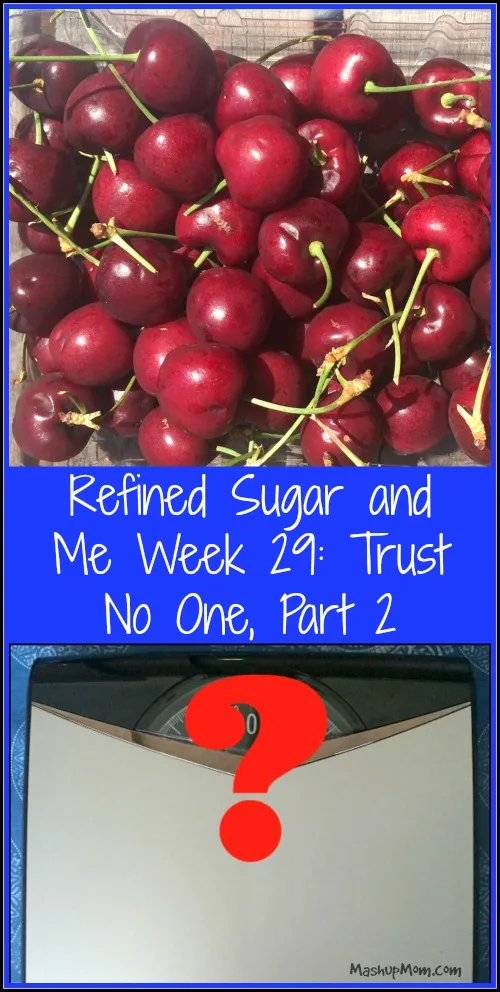


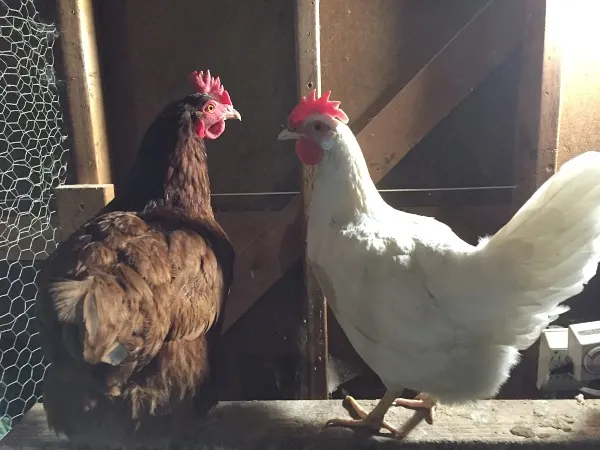
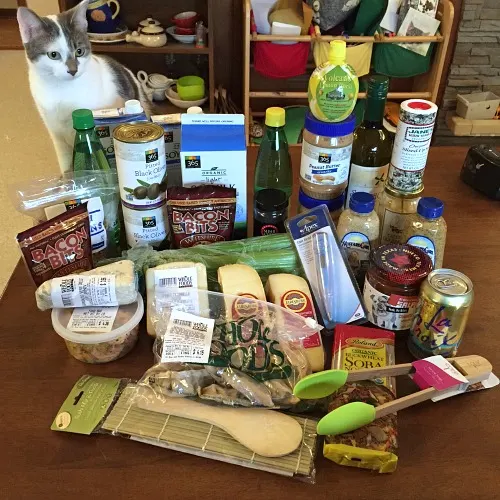

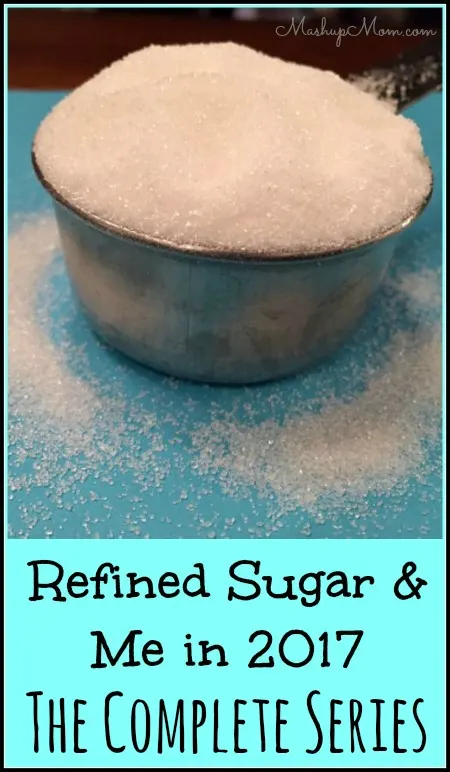
SmartShopper
Thursday 20th of July 2017
Hi Rachel. I look forward to reading your "Refined Sugar and Me" updates. It sounds like you have hit a plateau. Are you happy at your weight and want to stay where you are? If not, have you thought of what you can do next to revamp the weight loss? From what I've read (my favorite nutritional source is Dr. Mercola. I get his e-newsletter daily) is to eliminate grains. Yes, that means some of our favorite foods. No more wheat. No more corn. Dr. Mercola is very much into the Keto way of eating. I've been following him for about 10 years. His health knowledge is incredible! Now, it's time for me to find the will power to follow. I'm only half way there. I'm a work in progress. Good luck to you and I look forward to your next update to see what you are up to.
peaches
Thursday 20th of July 2017
I don't trust anything that Dr. Mercola says. I know he has his fans though. I have hit a plateau with my weight loss too, but at least I have not gained any weight back. The class I was involved with in Northbrook, only went on for five months. Now we just meet once a month, and we don't get weighed. I found out the weigh ins motivated me to exercise more, and stay away from the junk food when I am out. I am now exercising less, and I have started consuming frozen yogurt, which I gave up for 5 months. Yes you might lose more weight with a keto diet, but is it sustainable, where as something like weight watchers I could see myself going on long term. I would love to lose another five pounds so I could fit in all my size 10 clothes, and ideally I would like to lose 20 more pounds, but it is harder to lose weight when you have gone into menopause, which I have.
peaches
Wednesday 19th of July 2017
Here is an interesting article that somebody posted over at lthforum.com, about the glut of farmer's markets in the Chicago area. Chicago neighborhoods decide that they want to start a farmer's market, but there are only so many farmer's available, and some farmer's do not want to sell at a market that only gets 300 buyers a week. That is why a lot of the French markets have lots of sellers, but few of them are actual farmer's. The article also mentioned that when there are more farmer's markets, that means that somebody that used to go to another market, will now start going to one in their neighborhood instead. Younger people also are not learning to cook, and when they do go to market's they mostly get already prepared foods. One of the organic growers that comes to Evanston says that his swiss chard sales have gone down 50% in the last five years, because more people are purchasing crepes or whatever prepared item looks good. Here is a link to the article. https://www.dnainfo.com/chicago/20170717/lincoln-park/famers-markets-produce-city-too-many
I also want to mention that yes there are some mega organic farms that kind of cheat on the organic rules. Egglands Best was given as an example in one of the articles that Rachael gave a link too. Horizon is another good example. When you buy organic at the farmer's market though, you get to meet the farmer, and many times he will give you free samples, and you can usually tell who promotes themselves as being organic but they are not. There are 3 certified organic growers that come to the Evanston market, and I am sure that all 3 of them are 100% organic. As a matter of fact one of them brings edible weeds such as purslane that come from his farm. I have a ton of purslane in my garden right now, and I add it to salads.
BTW- There is only a quarter of a crop of peaches in the South this year, and so they are not going to be readily available and cheap this year. Michigan has a ton of peaches this year though, and so please try to hit your local farmer's market to get some. They will be available the next two months. They will be better tasting in two weeks. If anybody is going to be in Michigan starting the end of July, they can upick some wonderful peaches at my sisters farm, right off of I-94 at the Coloma exit. Her farm is called Fruit Acres.